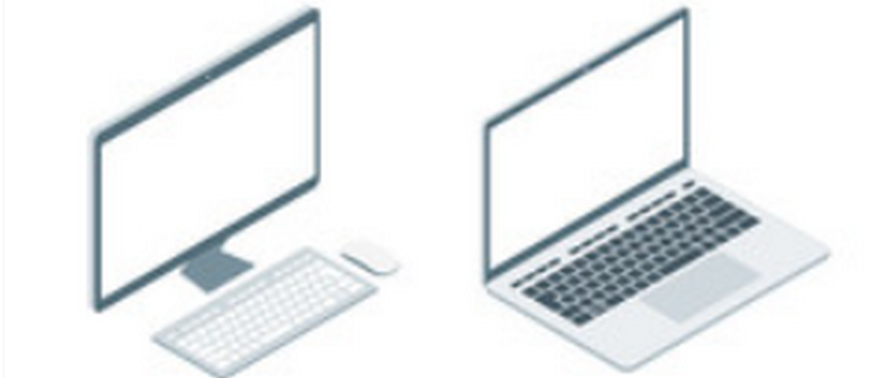
In the dynamic world of personal computers, deciding between a desktop and a laptop can often be a game-changer. Both have their benefits and drawbacks, meeting the needs of different types of users. In order to make a well-informed decision that suits your needs, it is essential to understand the advantages and disadvantages of laptops and desktops. In order to help you make a decision, this article will compare the two and highlight the important factors.
Benefits of Using a Laptop
1. Convenience:
One major perk of computers is how convenient they are to bring along wherever you go. These portable electronics let people take their computing power with them wherever they go. The mobility of laptops offers unrivaled convenience, whether you’re a student hopping from class to class or a professional working remotely.
2. Minimizing Unused Space:
Laptops are compact and take up very little room when not in use. Those who value a minimalist work space or have a small desk may appreciate their tiny shape.
3. The built-in battery:
When traveling or in areas with limited access to electricity outlets, this capability is absolutely essential.
4. Super Convenient Design:
Advantage: The display, keyboard, and trackpad or touchpad are all part of the same compact unit as laptops. Reduced cable clutter and simplified setup are two benefits of an all-in-one design.
5. Linking wirelessly:
The built-in Wi-Fi and Bluetooth capabilities of laptops eliminate the need for additional accessories when connecting wirelessly to the internet or other devices. This is a major pro.
Drawbacks of portable computers
1. You can’t really upgrade it:
Cons: Unlike desktop computers, laptops usually don’t come with a ton of different upgrade possibilities. Depending on the model of laptop, upgrading components like the graphics card or processor could be difficult, if not impossible.
2. Performance Decrease:
Downside: Even while laptops pack a punch, they might not be able to compete with top-tier desktops in terms of performance.
3. A Greater Reward for Efficiency:
Cons: Desktop-level performance on a laptop is usually more expensive. Expenses are higher because of the specialized components and the compact design.
4. Minimal Room for Gaming:
Cons: While there are gaming laptops, dedicated gaming desktops often have higher graphics capabilities and more customization possibilities. Desktop computers might be more suited for serious gamers.
5. Ergonomics and Small Screens:
Cons: People who need a bigger screen for a lot of work or enjoyment may not be good candidates for laptops because of their built-in screens’ size limitations. Furthermore, the fixed locations of the keyboard and screen can cause discomfort with prolonged laptop use.
Desktops’ Benefits
1. Exceptional Results:
One advantage of desktop computers is that they can house more powerful cooling systems, graphics cards, and processors due to their larger form factor. For resource-intensive jobs like video editing or 3D rendering, desktops are the way to go because of the improved performance they provide.
2. Future-proofing:
Pro: The great degree of upgradeability is one of the most notable benefits of desktop computers. Users have the freedom to update or replace certain components, such as the graphics card, RAM, or storage, which keep the system up-to-date.
3. Efficient Use of Money:
A desktop computer’s price-to-performance ratio is often higher than that of a laptop’s. Users have the option to construct a robust desktop computer at a lesser expense compared to a similarly powered laptop.
Personalized options:
Advantage: Desktops provide a great deal of room for personalization. Customization of the system’s components, peripherals, and even its aesthetics allows users to craft a one-of-a-kind computing experience.
Downsides of Workstations
(1) The Significance of Portability:
Desktop computers’ lack of portability is their main disadvantage. Once installed, a desktop is typically unmovable, limiting its mobility to a single area.
2. Need for available space:
Downside: Desktops aren’t always the best choice for apartments or shared spaces due to their bulky size and the amount of room they take up on a desk.
3. Battery Life Is Limited:
Con: Desktop computers do not come with batteries already installed, unlike laptops.
In the end, choosing the best option
In the end, your individual requirements and tastes will determine whether you should go with a desktop computer or a laptop. If you value portability, space efficiency, and being productive while on the go, a laptop is probably the way to go. However, a desktop computer can be better for you if you value efficiency, personalization, and speed. Think about your computer needs and weigh the pros and cons listed in this guide to make a well-informed selection. No matter if you like the portability of a laptop or the processing power of a desktop, each choice has its own set of benefits that cater to modern computing demands.